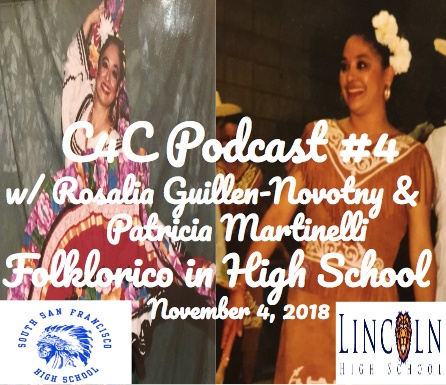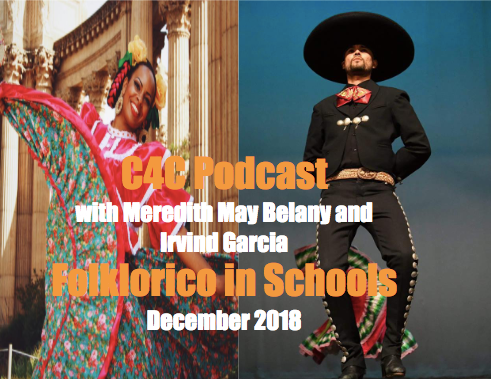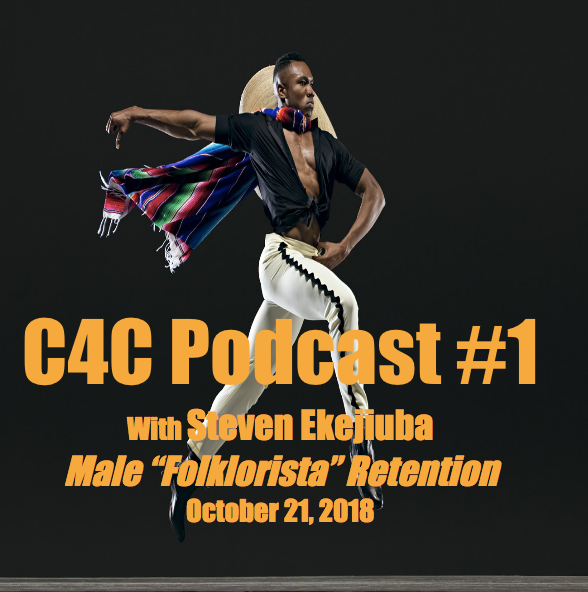Podcast #3: Folklorico in K-12 Schools
- Christopher Sandoval

- Oct 4, 2018
- 3 min read
Updated: Dec 17, 2018
High school folklorico program founders and legacies in their communities, sisters Rosalia Guillen-Novotny and Patricia Martinelli, will be engaging with C4C director Christopher Sandoval about the hardships and benefits of seeing Mexican folk dance or folklorico being institutionalized within the San Jose, CA and South San Francisco, CA high school system.

Preface:
Being in the field of education for the past 10 years, it has always been an ideal goal, at times unrealistic, to merge my passion for teaching Mexican folk dance with my professional career of elementary school teaching. Choosing to educate in predominantly, low income, Hispanic communities over the past ten years has made this goal ever so important. As I continue to navigate my professional teaching career in parallel with my Mexican folk background, I remain open-minded in teaching folklorico in different educational realms, and have recently began teaching a performance based high school folklorico group in San Jose, CA. This is what brought me to invite recent mentors of mine, as well as sisters, who have each created their respective legacy and pipeline of a folklorico program in the Bay Area high school system. As an educator, teaching folklorico can be more than sustaining a space for dance skills. It demands a more comprehensive and holistic approach to "serving the art". Without stepping too far in theory, a high school folklorico program should maintain a firm balance of discipline, social studies, and community awareness. Bringing maestras Rosalia and Patricia to this podcast sheds a very realistic and emotional light on the ups and downs, the milestones and struggles, and lessons learned in establishing their high school folklorico programs that are now more than 25 years old. We hope you enjoy the podcast!
Podcast Highlights:
1) Part 1 - Introductions and Family Values
Patricia and Rosalia share how their families have played integral roles in bringing to fruition their respective goals of institutionalizing a Mexican folk program in the high school system.
2) Part 2 - Building a Folklorico Pipeline in the Community
Patricia and Rosalia discuss with me their own journeys in creating and sustaining their own high school program such as struggles of funding and professional relationships, and powerful experiences, and milestones.
3) Part 3 - Reflections, Critiques, and Wisdom
Patricia and Rosalia reflect on how they now see their current roles as mentors supporting the goals and vision of the high school programs they passed on, as well as how they continue to give back in other ways and spaces. Moreover, they discuss with me their critiques of what they envision makes a strong and intentional folklorico program in the high school system. As they share their wisdom throughout this discussion, they recognize their gratitude towards all the stakeholders in their past work such as mentors and students. They also discuss the strong stances they needed to have against the pushback and toxic lenses others had in their work and the folklorico community, as similarities and differences were highlighted amongst their program history.
4) Part 4 - Reflections, Critiques, and Wisdom (continued)
Patricia and Rosalia reflect on how they now see their current roles as mentors supporting the goals and vision of the high school programs they passed on, as well as how they continue to give back in other ways and spaces. Moreover, they discuss with me their critiques of what they envision makes a strong and intentional folklorico program in the high school system. As they share their wisdom throughout this discussion, they recognize their gratitude towards all the stakeholders in their past work such as mentors and students. They also recognize the strong stances they needed to have against the pushback and toxic lenses others had in their work, as similarities and differences were highlighted amongst their program history.
Findings:
I personally felt I have always had an underdog story in this work of folklorico, and more so appreciate the unsung heroes of this work. Being a social practitioner of Mexican folk dance for 10 years provides you enough access to social capital, literature, and even chisme to who are the folklorico "greats" of our time and past. I do hold respect to their accomplishments, but always find a more unique interest for the hundreds around those few iconic folkloristas who devote the better part of their lives to serving the art as well. These two individuals, Rosalia Novotny and Patricia Martinelli, have surpassed my expectations for receiving an intimate second eye account of what is possible of accomplishing, even when things seem impossible, in regards to institutionalizing folklorico in the public high school system. My sincerest gratitude goes out to these two new mentors of mine for the time and courage they took in sharing their life's work with me and all of our listeners.

















Great podcast with two talented maestras. Loved all of it!